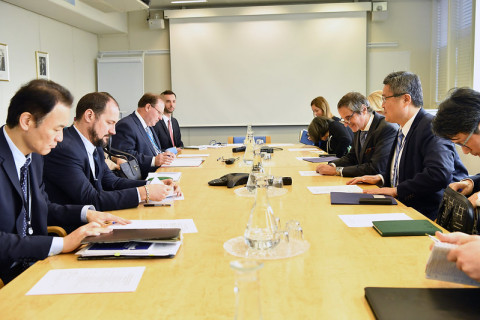What is the Japanese Negotiation Style?
The Japanese culture can be tricky to understand.
The people have particular ways of doing things, polished over hundreds of years of history, that seem peculiar to the outsider.
This is especially true when doing business or working with the Japanese in a professional capacity.
Despite the country’s global exposure through trade, commerce and politics, on the whole, many Japanese are not very well exposed to foreigners.
As a result, it’s critical for foreigners working with the Japanese, to understand the people, the culture and how they approach things.
DON'T MISS THE FREE SAMPLE OF OUR
ELEARNING COURSE ON JAPANESE BUSINESS CULTURE
AT THE END!
The Art of Negotiation in Japan
The whole process of ‘doing business’ in Japan, or with the Japanese, can leave many confused.
This is especially true during negotiations which can leave many people scratching their heads.
We are going to briefly explore some common challenges faced by those new to negotiating with the Japanese.
If you work with the Japanese, then we also recommend taking our eLearning course on working with the Japanese. You’ll see more information on this at the end of the page.

The Japanese negotation style reflects the values of Japanese society.
Click here to learn more about Japanese culture, values and etiquette
Photo by Ryutaro Tsukata from Pexels
3 Common Challenges When Negotiating with the Japanese
When it comes to negotiations, there are many challenges faced by foreigners.
This is especially true if no research has been done into the Japanese culture and how they approach ‘business’.
Some of the key points foreigners need to know about negotiating with the Japanese include....
1. The Purpose of Meetings
The Japanese approach meetings very differently to many cultures, especially North American and Western European.
They see meetings as having formal protocols and also expect several meetings to happen, in a particular order.
If you come from a country where you expect things to ‘get done’ in a single meeting, then Japan is going to be a wake-up call!
Before you approach negotiations, get ready for the long haul, and understand the process they expect you to go through.
On top of this, you need to pay attention to protocol – business cards, how to address people, seating and all that good stuff.
2. Group vs Individual
The Japanese approach negotiations as one, as a group.
They don’t come to the negotiation table with a personal view or even the inclination to give one. They are there for the group and to work for the group’s benefit.
If you plan to negotiate in Japan, you need to be prepared to meet lots of people, from lots of positions, in order build consensus.
Consensus building, a process known as Nemiwashi in Japanese, is fundamental to the Japanese way of making decisions.
3. ‘Face’ and Being Polite
The need to maintain harmony, especially in public, has a powerful influence over people in Japan.
This is especially true when it comes to the communication style, which can come across as ‘polite’ to some and ‘evasive’ to others.
The Japanese go to extreme lengths to show respect and protect the feelings of others.
How they express this, i.e. the use of silence, body language, ignoring questions and avoiding having to say “no”, can cause real confusion to foreigners who don’t know how to interpret it.
9 Tips on Negotiating with the Japanese
Before entering into negotiations with the Japanese, do a little homework.
Learn about their approach and their expectations and especially their business values.
Here are some quick-fire tips on how to successfully negotiate with the Japanese.
- The first contact you make in a Japanese organisation will usually be involved in the whole negotiation process – they are a key person, so invest a little time in getting to know them.
- The Japanese negotiate in teams, but these members of the team may change with every meeting as you meet people from different departments or with specific skills – do your best to answer everyone’s questions and concerns.
- Questions asked within a meeting are not an invitation to come to some sort of conclusion about it there and then; questions are for information only – don’t push people for answers or commitments based off the back of their questions.
- Decisions are rarely if ever made in an actual meeting. It’s usually done beforehand and then formally announced in the meeting – so, be patient when it comes to big decisions and remember to keep talking to people outside of the negotiation room.
- Japanese negotiators tend to come to the table with a position that they have to stick to – don’t push for flexibility in the meeting room; this should be done outside of the meeting room, even over a meal or a drink.
- The Japanese like to take their time and go over points many times in order to avoid mistakes and to mitigate risks – never interpret this as time-wasting and even worse, never express concern that it is an unnecessary waste of time!
- Their due diligence means that once the Japanese are ready to go, they expect you to be ready to go too! – be prepared, as stumbling at this stage could cause the Japanese to slam on the breaks.
- A cultural fit is very important to the Japanese, so be prepared to invest time in relationship building – nominication is a common way for people to relax in the evenings and speak their minds.
- The Japanese negotiating style tends to be impersonal and unemotional, but at the same time, they want to know, like and trust the people they are doing business with – try to approach the negotiation with a mix of facts and statistics as well as personality and warmth.
Go Pro! Take a Course on Japanese Business Culture
If you want to learn more about working with the Japanese, we have a free eLearning course available.
It covers everything from the Japanese culture to Japanese communication and how they approach business.
You can watch the sample video here or on the course page where you can also upgrade and find out more.
Main image by IAEA Imagebank (CC BY 2.0)
By accepting you will be accessing a service provided by a third-party external to https://www.commisceo-global.com/

 +44 0330 027 0207 or +1 (818) 532-6908
+44 0330 027 0207 or +1 (818) 532-6908
